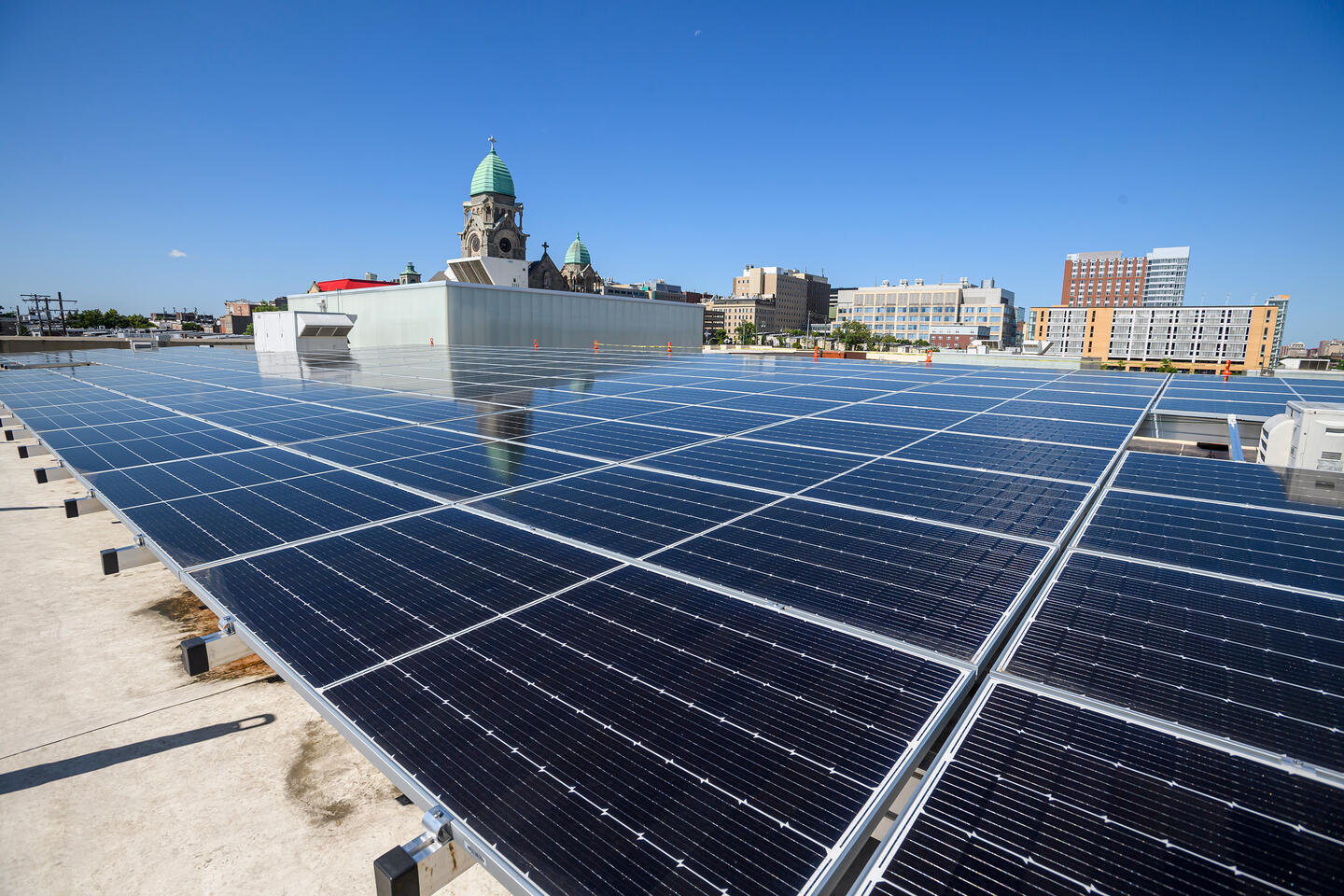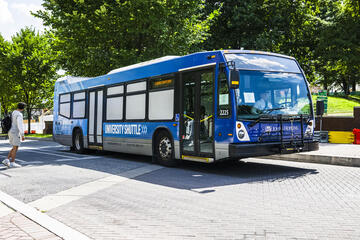Johns Hopkins University has unveiled its comprehensive plan to strengthen environmental protections over the next decade by implementing sustainable practices across all campuses and enhancing its teaching and research related to sustainability and climate change.
The JHU Climate Action and Sustainability Plan—developed over the past two years with input from thousands of students, faculty, staff, alumni, and Baltimore residents—commits to:
- Achieving net-zero emissions by 2040 by phasing out on-campus fossil fuels and by transforming the design and operation of new and existing buildings;
- Purchasing all electricity from renewable sources by 2030;
- Deploying a fully electric Homewood-Peabody-JHMI vehicle fleet by 2026, with the first electric buses scheduled to be on route by early 2025;
- Ensuring that all light-duty and passenger vehicles purchased by the university are all-electric by 2030;
- Increasing the diversion of all waste to 50%, in part by eliminating plastic water bottles and by partnering with university and city stakeholders to increase composting and minimize wasted food;
- Expanding the impact of research and teaching to develop global solutions and train future leaders, thereby preparing for the communitywide impacts of climate change.
Video credit: Aubrey Morse and Roy Henry / Johns Hopkins University
"Climate change stands as simply one of the most important issues that confronts us as a society. Not only is it monumental; it's existential," JHU President Ron Daniels said. "As the nation's first research university, it's our obligation, it's our duty, it's our opportunity to harness the collective capabilities of our university and to develop concrete solutions for the challenges of climate change at a number of different levels."
Added Julian Goresko, director of Sustainability and the plan's co-chair: "This plan will serve as a roadmap for the next decade—one that mitigates environmental harm through responsible campus operations while developing impactful outcomes through our research, education, and community partnerships. We are thrilled to embark on this journey and build off the university's many existing sustainability efforts."
Net zero by 2040
One of the most prominent efforts to tackle climate change at Johns Hopkins began in 2007 when a university task force set a goal to reduce greenhouse gas emissions by 51% by 2025. A landmark solar power purchasing agreement between Johns Hopkins and Constellation Energy—the largest in Maryland when it was signed in 2019—helped the university achieve the goal three years early in 2022. To date, the reduction stands at 57% despite a 14% growth in the university's physical footprint.
The new goal: Net zero emissions by 2040. In addition to committing to purchasing 100% of its energy from solar and other renewable sources by 2030, the university is deploying multiple strategies to eliminate greenhouse gases. This includes cutting-edge sustainability standards for new buildings and the management of existing facilities, which are responsible for about 90% of the university's greenhouse gases.
In alignment with these priorities, all new construction and renovations will now comply with a new set of High-Performance and Healthy Building Requirements aimed at reducing energy consumption and emissions. For example, the new student center slated to open next year is being constructed with mass timber, a low-carbon building material that is an alternative to steel and concrete. Additionally, the 6,400 cubic yards of concrete that were used to build the Hopkins Bloomberg Center in Washington, D.C., were produced by CarbonCure technology.
Coupled with decarbonization studies for each major JHU campus, these measures will help contribute to energy efficiency, demand reduction, and planning for expanded renewables and electrification.

Image caption: Johns Hopkins University is committing to purchasing 100% of its energy from solar and other renewable sources by 2030. These solar panels installed on the roof of the Henderson Hopkins School help to provide power to 150 homes in East Baltimore.
Image credit: Will Kirk / Johns Hopkins University
Electric bus fleet by 2026
One of the most immediately visible effects of the Climate Action and Sustainability Plan will be the new electric buses, which are slated to serve the school's busiest route between the Homewood and Johns Hopkins Medicine campuses. The Maryland Energy Administration recently awarded a $1.5 million grant to Johns Hopkins for the $5.5 million purchase of five electric buses to replace its existing diesel fleet serving that route. "The new electric buses are expected to operate for at least 12 years and will significantly reduce emissions in overburdened and underserved communities along the route," the grant award states.
Also see
The fully accessible buses are anticipated to begin operating in early 2025. The route's fleet of 10 buses is scheduled to be fully electric by 2026. By 2030, all purchases of other university vehicles will be required to be electric.
"Transportation accounts for 25% of Baltimore's greenhouse gas emissions and is a primary contributor to regional air quality, making the reduction of these emissions a critical component of JHU's action on climate and environmental justice," the plan states.
Responsible consumption
The university centers its impact on the community throughout the plan, including as one of the largest purchasers of goods and services in Baltimore and Maryland. As an anchor institution, the university "has a responsibility to integrate sustainability practices into our entire value chain, including areas of procurement, food systems, and waste management," the plan states. "Minimizing waste and responsibly managing our purchases through end-of-life are essential to reducing our impact on the environment and improving public health, particularly as it relates to environmental justice concerns in Baltimore."
The university has voiced support for the city's interest in building a local composting facility, which recently received a $4 million grant from the U.S. Environmental Protection Agency. Going forward, Hopkins will expand its composting and other food waste reduction efforts and is currently a participant in the city's food scrap drop-off program at Homewood and in East Baltimore.
Under the new Sustainability Plan, the university will eliminate the sale of plastic water bottles, which will be replaced with alternatively packaged options as well as expanded bottle filling stations across all campuses. The university's food waste reduction strategy also includes partnerships with local nonprofits. The target goal is to increase the amount of waste diverted from landfills or incineration to 50% by 2030.
In addition, Hopkins plans to source 40% of Hopkins Dining food locally, including at least 15% from Baltimore businesses by the start of the next decade. HopkinsLocal will be pivotal in this effort and is already establishing strategic partnerships with local farmers, vendors, and other entrepreneurs to achieve the new goal.
All the university's strategies aim to support the sustainability goals of city and state governments, including the city's target of 40% tree cover. The university intends to assess the designation of Homewood as an arboretum to further increase the campus's tree canopy, policies, and education.
"From the outset, JHU worked to incorporate the broader community's perspective," said plan co-chair Megan Weil Latshaw, an associate teaching professor in the Department of Environmental Health and Engineering. "We must do more, by understanding our impact, by centering the perceptions of those affected by our policies, and by co-creating new programs and solutions. The plan aims to uplift the voices of Baltimore community members and help bring justice to those unfairly impacted by environmental exposures."
Support for innovation
In recent years, the university has launched multiple new programs and academic institutes dedicated to sustainability, alternative energy research, and climate change solutions. The commitment arises from the university's Ten For One strategic vision, which aims to "make Johns Hopkins a leading source of solutions for the planet's transition to a low-carbon, healthy, and resilient future."
For example, the university launched the Institute for Planetary Health earlier this year. It also opened the Ralph O'Connor Sustainable Energy Institute in 2021, which is establishing a green energy technology lab in Remington to foster entrepreneurial ideas around sustainable energy.

Image caption: The university's Ralph O'Connor Sustainable Energy Institute is establishing a green energy technology lab in Remington to foster entrepreneurial ideas around sustainable energy.
Image credit: Will Kirk / Johns Hopkins University
In addition, the Applied Physics Laboratory supports multiple cutting-edge projects for combating and preparing for climate change, including Climate TRACE, RePLICaTE, and Air Quality Modeling.
The research, scholarship, and on-the-ground instruction through programs such as Campus as a Living Lab are aimed at cultivating future leaders in sustainability, preparing the university and Baltimore for the worst effects of climate change, and discovering new research that can help to head off environmental calamities.
"It's energizing to see the university's commitment to lead on solutions-oriented research and to train the next generation of sustainability and climate leaders," said plan co-chair Benjamin Zaitchik, who also serves as chair of the Department of Earth and Planetary Sciences. "[The plan] speaks both to our institutional responsibilities and to the tremendous strength of Johns Hopkins University to drive innovation in response to shared global challenges."
Posted in University News
Tagged sustainability, climate change, office of sustainability, planetary health











